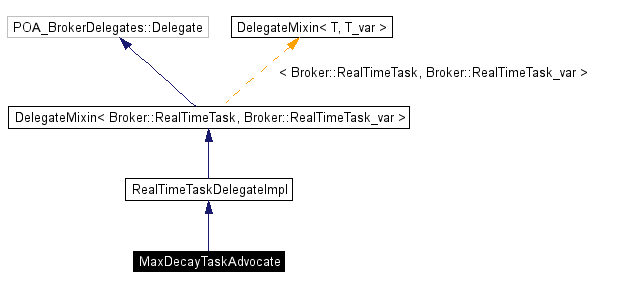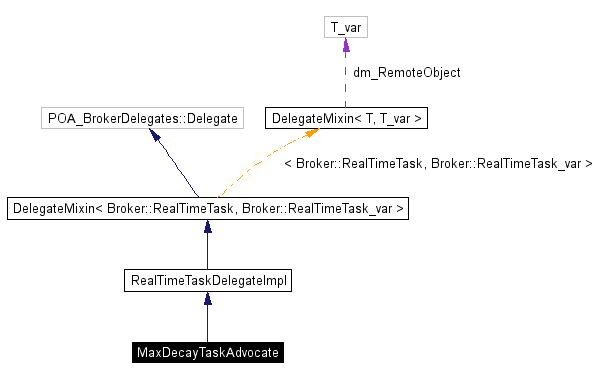


The actual implementation works by sending an advice that reflects the highest usage seen in the last N periods, where N can be set using the SetDelegateAttribute method.
Definition at line 31 of file MaxDecayTaskAdvocate.hh.
Public Member Functions | |||||||||||||
| MaxDecayTaskAdvocate (void) | |||||||||||||
| Default constructor. | |||||||||||||
| virtual | ~MaxDecayTaskAdvocate (void) | ||||||||||||
| Destructor. | |||||||||||||
| virtual void | SetDelegateAttribute (const char *id, const CORBA::Any &value) throw (CORBA::SystemException) | ||||||||||||
| |||||||||||||
| virtual CORBA::Any * | GetDelegateAttribute (const char *id) throw (CORBA::SystemException) | ||||||||||||
| |||||||||||||
| virtual Broker::CPUReserve | PassCPU (Broker::RealTimeTask_ptr rtt, const Broker::CPUReserve &status, const Broker::CPUReserve &advice, const Broker::KeyedReportParameters &krp) throw (CORBA::SystemException) | ||||||||||||
| This method would then be used by adaptation proxies to change the advice parameter to their liking.
| |||||||||||||
Private Attributes | |||||||||||||
| CORBA::ULong | md_LastAdvice | ||||||||||||
| The last advice reported by this advocate. | |||||||||||||
| CORBA::ULong | md_SubMax | ||||||||||||
| The maximum observed usage that is still below the last advice given. | |||||||||||||
| unsigned int | md_Decay | ||||||||||||
| The number of periods left before the reservation will be dropped to the value of md_SubMax. | |||||||||||||
| CORBA::ULong | md_DecayAfter | ||||||||||||
| The number of periods after which the advice should decay. | |||||||||||||
|
|
Currently supported 'id' values are:
Reimplemented from DelegateMixin< Broker::RealTimeTask, Broker::RealTimeTask_var >. Definition at line 77 of file MaxDecayTaskAdvocate.cc. References DelegateMixin< Broker::RealTimeTask, Broker::RealTimeTask_var >::GetDelegateAttribute(). |
Here is the call graph for this function:

|
||||||||||||
|
Currently supported 'id' values are:
Reimplemented from DelegateMixin< Broker::RealTimeTask, Broker::RealTimeTask_var >. Definition at line 49 of file MaxDecayTaskAdvocate.cc. References DelegateMixin< Broker::RealTimeTask, Broker::RealTimeTask_var >::SetDelegateAttribute(). Referenced by paGetAdvocate(). |
Here is the call graph for this function:

 1.3.9.1
1.3.9.1